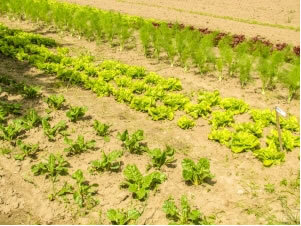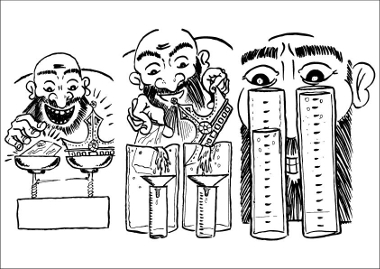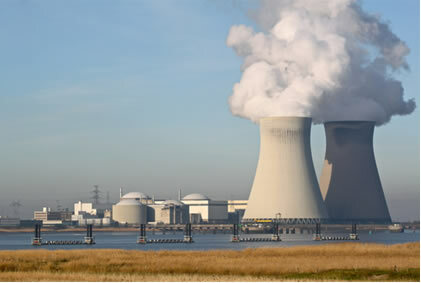Chemistry has made discoveries over the years that have contributed greatly to the increase in agricultural production. An example is the discovery of the synthesis of ammonia, which led to the production of nitrogenous chemical fertilizers. To learn more about the use of fertilizers in crops and crops you can read the text “Organic and Inorganic Fertilizers”.
All this chemical evolution guaranteed the possibility of producing enough food for the entire population of the planet. Even so, a problem that still persists is the hunger.
This is primarily due to the unequal distribution of income. As you can see in the images below, in certain places the food produced is wasted, being thrown in the garbage; in others, such as Africa, there is hunger and misery.

Social inequality: wasted vegetables and children understanding their hands in the Dadaab refugee camp, Somalia, on 15 August 2011*
This waste is also a consequence of the type of transport, storage and sale. In addition, the development model adopted in most countries, the so-called
"consumer society", it drives industries and factories to extract the maximum amount of resources from the planet to accumulate wealth and satisfy exaggerated consumerism.The adopted agricultural models also favor a few over many, and even in rural areas, where food should be produced, many people live below the poverty line earning less than a dollar a morning.
This is because national and international policies favor an agricultural model with high specialization, less diversity and greater use of chemical products. Preference is given to cultivation intensive monocultures, with excessive use of fertilizers and pesticides that end up polluting the soil and water and causing serious changes in the ecosystem and in the health of the population. In the text "Water pollution from agricultural tailings” provides more details on how this type of pollution occurs.
In addition, monoculture brings another problem, it is often necessary to burn crops, which emits large amounts of greenhouse gases.
These two problems: poverty and environmental degradation, are central themes of the Rio +20, a United Nations Conference on Sustainable Development. This event will seek to contribute to a change in this form of model established until then, replacing it with a model of sustainable development, in which the needs of the present are met without compromising the possibility of future generations also satisfying their needs.
Thinking about the aspect of agriculture and food, at the event itself, the menus were prepared in order to contemplate the principles of inclusive gastronomy, offering organic food and family farming. In addition, the event's National Organizing Committee prepared the document “Sustainability Guidelines for Food Companies”, which provides guidance on good sustainable practices in the sector.
Do not stop now... There's more after the advertising ;)
Family farming will also be widespread at this event. See an excerpt from Brazilian Contribution Document to the Rio+20 Conference:
“Rio+20 should pay particular attention to the role of family farming, which in most developing countries, is responsible for a large part of occupation in the rural sector and production agricultural. Family farming favors the use of more balanced production practices, such as diversification of crops, less use of industrial inputs, sustainable use of genetic resources and agroecology. Family farming can be an example of the practice of sustainable development when it is environmentally appropriate, economically viable, socially fair and culturally appropriate.” (Document of Brazilian Contribution to the Conference Rio+20, p. 16, 2011)
A very interesting project promoted at this event is Urban Agriculture, which aims at producing food, recycling garbage and promoting environmental education.
To make agriculture sustainable, some initiatives can also be taken, such as:
- Crop rotation:when soil nutrients become insufficient for a certain crop, another species is planted and thus the use of fertilizers is reduced;
- Use of biological insecticides: You can use species of bacteria or insects that fight pests, without harming the environment;
- Choose natural fertilizers.

In fact, in 2010 Brazil created the Low Carbon Agriculture Program (ABC) which provides subsidies and financing for encourage rural producers to take measures to reduce greenhouse gas emissions, helping to minimize warming global. Among the program's initiatives are:
- Direct planting in straw;
- Recovery of degraded areas;
- The crop-livestock-forest integration;
- The treatment of animal waste.
The environmental issue and poverty eradication need, however, to go beyond just adapting development to a new situation on the planet. Santos e Mól, in their book “Química e Sociedade”, from 2005, bring some policies that need to be adopted so that the interests the maintenance of life are above economic interests, and so that development does not increase social differences, such like:
- New policies that eliminate international practices that harm less developed countries;
- That encourage the use of agroecological techniques;
- That discourage polluting practices;
- That transfer subsidies to ecological agriculture;
- That ensure women equal rights to agricultural work;
- That encourage new research for ecological agriculture.
*Image credits: Homeros and Shutterstock.com.



